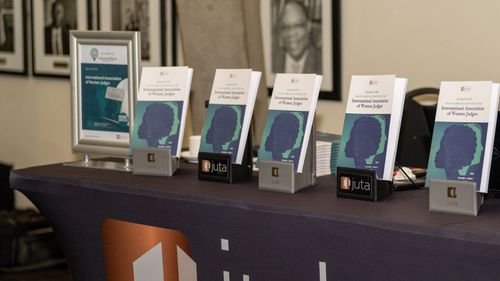- Home
- Products & Services
- About
- Blog
- Faq
- Contact Us
The mission of the South African Law Reform Commission (SALRC) is the continuous reform of all branches of the law of South Africa in accordance with the principles and values of the Constitution to meet the needs of a changing society operating under the rule of law.
As part of their venture to fulfil this mandate and with Juta as a sponsor, the SALRC invites all law students studying towards an LLB or LLM at a South African University to submit their innovative ideas championing law reform issues into the annual South African Law Reform Commission Legal Essay Writing Competition, the 2022 results of which were announced last month at the annual event.
The LLM category winner, “THE GUARDIAN’S FUND AS THE APPROPRIATE RECEPTACLE OF LUMP-SUM FUTURE MAINTENANCE FOR CHILDREN,” by UNISA student Jemillo Adriaan, examines whether or not the Fund is the appropriate receptacle to administer lump-sum future maintenance for children, and if so, what reform is required for the benefit of children.
We spoke to Adriaan about his winning submission and the inspiration behind it.
What was your inspiration for participating in the SALRC essay writing competition?
The SALRC plays an integral role in; inter alia the reforming of various areas of the law in order to keep abreast with new developments and deal with gaps identified in existing laws. In addition, the competition is in honour of the legacy of our late Chief Justice, Pius Langa. I consider it a privilege to make a contribution to his legacy and to add to the important work done by the SALRC, however small such a contribution may be.
Your essay focused on the Guardian’s fund as the appropriate receptacle of lump-sum future maintenance for children. What was your personal inspiration for writing on this particular topic?
Parents avoiding maintenance obligations is a matter which affected me directly as a child and indirectly in my work and the community I grew up in. The plight of the most vulnerable members of our community (women and children involved in maintenance disputes) served as my inspiration to develop additional mechanisms as well as improve existing mechanisms to ease the burden of collecting maintenance from defaulters. To this, the receptacle responsible for administering future maintenance was critically analysed to determine whether it is the most appropriate.
In your essay, you note two areas for reform in the Maintenance Act, identified by the SALRC. Why, in your perspective, is it important to look at the act in the context of South Africa’s society as it is today?
In the landmark Constitutional Court case of Bannatyne the learned judge held that, “It is a function of the state not only to provide a good legal framework, but to put in place systems that will enable these frameworks to operate effectively. Our maintenance courts and the laws they implement are important mechanisms to give effect to the rights of children protected by section 28 of the Constitution. Failure to ensure their effective operation amounts to a failure to protect children against those who take advantage of the weaknesses of the system.” This extract accords with my views. The laws applied in our maintenance courts are intended to give effect to the constitutionally enshrined rights of children as envisaged in s28 of the Constitution. Courts can only do lip service to these laws if there aren't effective operations and practical mechanisms within which the laws are to operate them. From the excerpt above it is evident that effective processes are initiated to close the gap.
Can you share with us the kind of change or transformation you would like to see in the justice system?
The laws and policies are in place. It is the effective implementation thereof that can be improved. When gaps in the law are identified, the process of filling these gaps must be closed as speedily as possible. I would also like to see that the priority of modernisation of systems (technology) is more rigorously implemented to accelerate access to the most needed services to the most vulnerable.
Can you share some of your personal aspirations around the difference you would like to make in the field of law?
The Guardian’s Fund is such a vast, misunderstood and underdeveloped area in our law. My goal is to improve awareness of the purpose and functions of the Guardian’s Fund within the legal fraternity generally and within the community specifically.
Disclaimer - The views expressed in this interview are Jemillo Adriaan’s in his independent capacity and not as a representative of the Department of Justice.
Read the full essay here.

Kagiso Tiso & Kagiso Media Fraud Hotline: 0800 21 25 83


